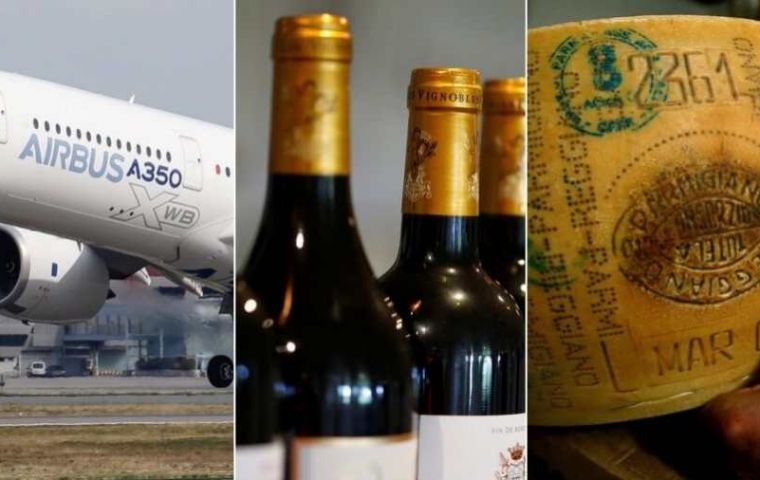MercoPress. South Atlantic News Agency
US will impose 10% tariffs on Airbus planes and 25% on French wine and Scotch
 The announcement came after the WTO gave Washington a green light to impose tariffs on US$7.5 billion worth of EU goods annually in the long-running case
The announcement came after the WTO gave Washington a green light to impose tariffs on US$7.5 billion worth of EU goods annually in the long-running case United States on Wednesday said it would enact 10% tariffs on European-made Airbus planes and 25% duties on French wine, Scotch and Irish whiskeys and cheese from across the continent as punishment for illegal EU aircraft subsidies.
The announcement came after the World Trade Organization gave Washington a green light to impose tariffs on US$7.5 billion worth of EU goods annually in the long-running case, a move that could ignite a tit-for-tat transatlantic trade war.
The U.S. Trade Representative’s target list for EU tariffs, set to take effect on Oct. 18, includes large Airbus planes made in France, Britain, Germany and Spain for 10% tariffs.
But no tariffs will be imposed on EU-made aircraft parts used in Airbus’ Alabama assembly operations nor those used by rival U.S. plane-maker Boeing Co, safeguarding U.S. manufacturing jobs.
Instead, the list heavily targets the four Airbus consortium countries with tariffs, including French wine, Spanish olives, British whisky, sweaters and woolens and German tools and coffee.
Cheese from nearly every EU country will be hit with the 25% tariffs, but Italian wine and olive oil was spared, along with European chocolate.
“Finally, after 15 years of litigation, the WTO has confirmed that the United States is entitled to impose countermeasures in response to the EU’s illegal subsidies,” U.S. Trade Representative Robert Lighthizer said in a statement.
“We expect to enter into negotiations with the European Union aimed at resolving this issue in a way that will benefit American workers,” Lighthizer added.
WTO arbitrators said Boeing had lost the equivalent to US$ 7.5 billion a year in sales and disruption to deliveries of some of its largest aircraft because of cheap European government loans to Airbus.
The decision allows Washington to target the same value of EU goods, but bars any retaliation against European financial services.
It is part of a two-way dispute that diplomats and trade experts expect to lead to tit-for-tat European import tariffs against U.S. goods next year over state subsidies for Boeing.
The Trump administration asked the WTO for an emergency meeting to give the formal ratification needed for tariffs in mid-October.
Earlier this year, U.S. trade officials floated a US$ 25 billion list of European targets from planes to helicopters, wine, cheese, spirits and luxury goods. Goods from EU countries that are not part of the Airbus consortium, such as Italy would still be targeted, a USTR official said, because European Union nations all bear responsibility for the situation.
The world’s two largest planemakers have waged a war of attrition over subsidies at the WTO since 2004 in a dispute that has tested the trade policeman’s influence and is expected to set the tone for competition from would-be rivals from China.
The WTO had already found that both Europe’s Airbus and its U.S. rival Boeing received billions of dollars of illegal subsidies in the world’s largest corporate trade dispute.
The global trade body is due to decide early next year on the level of annual tariffs the EU can impose on U.S. imports.
While the level of tariffs amounts to less than three days’ worth of trade between Europe and the United States, importers led by U.S. airlines that buy Airbus jets have urged Washington to be selective when choosing industries to hit in order to avoid causing collateral damage to the U.S. economy.
EU manufacturers are already facing U.S. tariffs on steel and aluminum and a threat from U.S. President Donald Trump to penalize EU cars and car parts. The EU has in turn retaliated.




Top Comments
Disclaimer & comment rulesCommenting for this story is now closed.
If you have a Facebook account, become a fan and comment on our Facebook Page!